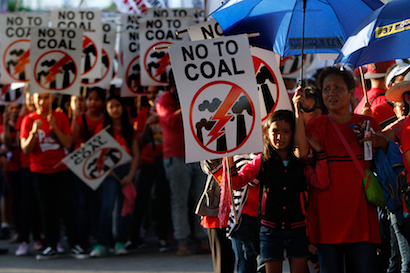This blog was originally published as a case study in Banking on Climate Change: Fossil Fuel Finance Report Card 2017, by RAN, BankTrack, Sierra Club, and Oil Change International, in partnership with 28 organizations around the world.
With installed capacity of 7,282 MW at currently operating coal plants, and a consistent place near the top of the list of countries most vulnerable to climate change, the Philippines does not need more coal power.
Yet burning coal is on the rise in the Philippines — and not with merely one or two replacement plants. A whopping 52 coal plants are currently proposed or under construction, while only 38 are in operation now. The Philippines has huge renewable energy potential, and part of the blame for this misguided, potentially climate-busting coal rush can be laid at the feet of Western banks, which have been propping up some of the key companies involved.
Western banks support coal power buildout in the Philippines primarily not through the provision of project finance, but via general corporate finance. Between 2014 and 2016, substantial financing of this sort went to the following companies planning coal power expansion in the Philippines:1
- The US company AES Corporation, from JPMorgan Chase, Morgan Stanley, Citi, Goldman Sachs, and Credit Suisse.
- The Korean company KEPCO, from Credit Suisse, UBS, and ING.
- The Filipino company San Miguel Corporation, from Standard Chartered, Credit Suisse, UBS, and ING.
With the backing of the Catholic Church, coal protests in the country are now routine and widespread, and have picked up momentum in recent years as a result of the planned explosion of new coal plants — making the Philippines one of the world’s most iconic battlegrounds in the fight against coal.
Impacts on local communities from proposed projects such as Batangas, Altimoa, and Limay are already being felt: in the absence of proper public consultation processes, families have been displaced from their homes without appropriate resettlement. In areas where Indigenous communities are present, the right to free, prior, and informed consent is not being respected.
Community resistance efforts have been met with threats and coercion. In July 2016, in the province of Bataan where the Limay plant is planned, one of the leaders of the Coal-Free Bataan Movement, Gloria Capitan, was shot dead by two unidentified assailants. Nonetheless, anti-coal protests in the Philippines continue undimmed.
Notes:
1. Financial research sourced from Bloomberg Professional Services and Profundo financial research.

